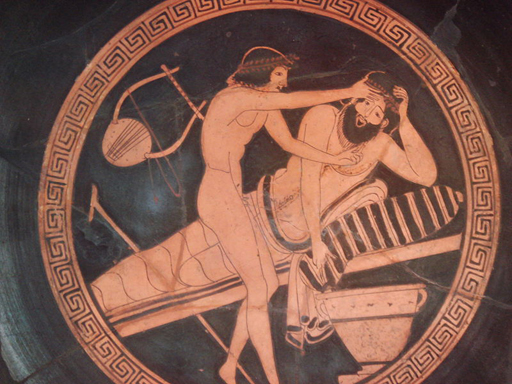3.1 Medicine and purging
Ancient medicine made much use of a range of types of purge, both upwards and downwards. For example, here is an extract from a late fifth century BCE medical text:
Emetics and clysters for the bowels should be used thus. Use emetics during the six winter months, for this period engenders more phlegm than does the summer, and in it occur the diseases that attack the head and the region above the diaphragm. But when the weather is hot use clysters, for the season is burning, the body bilious, heaviness is felt in the loins and knees, feverishness comes on and colic in the belly. So the body must be cooled, and the humours that rise must be drawn downwards from these regions. For people inclined to fatness and moistness let the clysters be rather salt and thin; for those inclined to dryness, leanness and weakness let them be rather greasy and thick. Greasy, thick clysters are prepared from milk, or water boiled with chick-peas or similar things. Thin, salt clysters are made of things like brine and sea-water. Emetics should be employed thus. Men who are fat and not thin should take an emetic fasting after running or walking quickly in the middle of the day. Let the emetic consist of half a cotyle of hyssop (a herb from the mint family) compounded with a chous of water, and let the patient drink this, pouring in vinegar and adding salt, in such a way as to make the mixture as agreeable as possible.
NB: 1 chous = 12 cotylae (thus, 5¾ pints). Is this the (huge!) dose, or the proportions in which it should be mixed?
Here is an example from the Roman writer, Celsus2 (On Medicine, 1.3, 19–23):
A vomit is more advantageous in winter than in summer, for then more phlegm and severer stuffiness in the head occur. It is unsuitable for the thin and for those with a weak stomach, but suitable for the plethoric, and all who have become bilious, whether after overeating or imperfect digestion. For if the meal has been larger than can be digested, it is not well to risk its corruption; and if it has already become corrupted, nothing is more to the purpose than to eject it by whatever way its expulsion is first possible. When, therefore, there are bitter eructations, with pain and weight over the heart, recourse should be had at once to a vomit, which is likewise of service to anyone who has heartburn and copious salivation or nausea, or ringing in the ears, or watering of the eyes, or a bitter taste in the mouth; similarly in the case of one who is making a change of climate or locality; as well as in the case of those who become troubled by pain over the heart when they have not vomited for several days. Nor am I unaware that in such cases there is prescribed rest, but that is not always within the reach of those who are obliged to be busy; nor does rest act in the same way with everybody. Accordingly I allow that vomiting should not be practised for the sake of luxury; on account of health I believe from experiment that it is sometimes rightly practised, nevertheless with this reservation, that no one who wants to keep well, and live to old age, should make it a daily habit. He who after a meal wants to vomit, if he does so easily should first take tepid water by itself; when there is more difficulty, a little salt or honey should be added. To cause a vomit on getting up in the morning, he should first drink some honey or hyssop in wine, or eat a radish, and after that drink tepid water as described above. The other emetics prescribed by the ancient practitioners all disturb the stomach. After a vomit, when the stomach is weak, a little suitable food should be taken, and for drink, unless the vomiting has made the throat raw, three cupfuls of cold water. He who has provoked a vomit, if it be early in the day, should after that take a walk, next undergo anointing, then dine; if after dining, he should the next day bathe, or sweat in the baths.
Both writers agree that winter is the season for vomiting because it is when the cold, wet humour called phlegm dominates the body. Celsus is suggesting that the only reason for it is to keep healthy; ‘for the sake of luxury’ suggests those who vomit simply in order to go on eating. But Celsus warns against vomiting every day, and he seems concerned about the effects of too much vomiting on the stomach. Although modern scholarship has debunked the myths about a special room in which diners went to vomit during dinner parties, it is clear that medical writers expected emetics to be used. What effects do you think all this purging would have?

